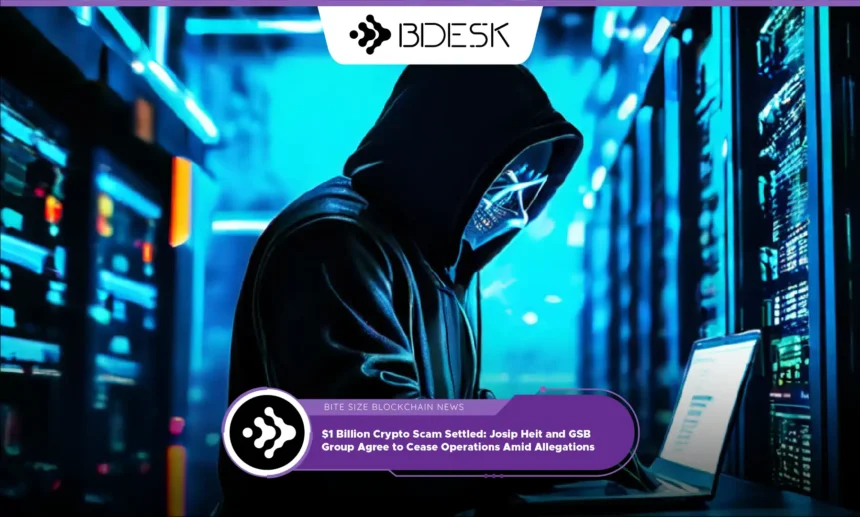Summary:
- Josip Heit and GSB Group Settle $1 Billion Ponzi Scheme Allegations: Five U.S. states have settled with Josip Heit and GSB Group over allegations of running a fraudulent cryptocurrency investment scheme.
- Settlement Without Monetary Penalties: Heit and GSB agree to cease operations without admitting wrongdoing, while pledging to reimburse affected U.S. customers in the settling states.
- False Promises of Gold-Backed Cryptocurrency: The scam misled investors with claims of tokenized skyscraper ownership, metaverse investments, and a cryptocurrency allegedly convertible into gold.
Crypto Scams and Legal Risks: Josip Heit and GSB Group’s $1 Billion Ponzi Scheme Settled
The cryptocurrency landscape, while promising tremendous opportunities for growth, has also become fertile ground for fraudulent activities. Scams within the crypto space have evolved, often disguised as legitimate investments backed by innovative technology, luring unwitting investors with lofty promises. One recent example of this is the alleged $1 billion cryptocurrency investment scheme orchestrated by Josip Heit and his GSB Group. Following a settlement with five U.S. states, Heit and GSB have agreed to cease their operations without admitting any violations of law.
This case highlights the potential dangers lurking in the world of crypto investments and serves as a cautionary tale for those exploring the fast-paced world of digital assets. In this article, we will explore the details of the GSB Ponzi scheme, what crypto scams like this entail, and what investors should look out for to stay safe in the volatile cryptocurrency space.
The GSB Group Ponzi Scheme: A $1 Billion Fraud Unraveled
In what has become one of the most talked-about crypto Ponzi schemes, Josip Heit, a prominent figure in the cryptocurrency world, and his GSB Group were accused of running a fraudulent operation that defrauded investors out of approximately $1 billion. According to reports by Bloomberg, the scheme involved a range of deceptive promises designed to attract investors seeking high returns in the crypto and metaverse sectors.
At the heart of the scam was a promise of tokenized partial ownership in a skyscraper, investments tied to the metaverse, and a cryptocurrency that was allegedly convertible into gold. These claims, while enticing to many, were nothing more than a mirage meant to lure in unsuspecting investors. As with most Ponzi schemes, early investors may have seen small returns, while later participants lost substantial sums as the scheme unraveled.
What Are Ponzi Schemes in Crypto?
A Ponzi scheme is a fraudulent investment scam that promises high returns with little risk to investors. Instead of investing funds as promised, the operator pays returns to earlier investors using the capital of new investors. The cycle continues until the operator can no longer attract new investors, leading to the inevitable collapse of the scheme.
In the case of crypto Ponzi schemes, scammers often promise revolutionary technologies, such as metaverse integration, tokenized assets, or gold-backed cryptocurrencies, to attract investors. However, these ventures rarely have any underlying value, and the operators simply use new investment money to pay earlier participants, making the scheme unsustainable in the long run.
Josip Heit and GSB Group Settle Without Admitting Wrongdoing
Under the terms of the settlement with five U.S. states, Josip Heit and the GSB Group have agreed to cease and desist from offering or selling unregistered securities. Notably, the settlement stipulates that Heit and GSB did not admit or deny any violations of law. This legal maneuver allows the group to avoid acknowledging any wrongdoing while also bringing an end to the investigation.
According to a press release, Avi Perry and Alex Spiro, attorneys representing Heit and GSB, stated that the five U.S. states involved in the case would withdraw all prior allegations of fraud and dishonest practices. Furthermore, no monetary penalties will be imposed, but Heit and the GSB companies have agreed to reimburse all eligible U.S. customers affected by the scheme in the settling states.
This settlement is seen as a critical moment in the ongoing fight against cryptocurrency fraud, particularly as the regulatory landscape continues to evolve. While Heit and GSB were able to escape without admitting fault, the fact that such a high-profile case was brought to light serves as a reminder that regulatory bodies are closely watching the crypto space.
Crypto Scams: How They Work and What to Look Out For
The rapid rise of cryptocurrency has made it a prime target for scammers. As digital assets become more mainstream, fraudsters are constantly finding new ways to exploit investors, particularly those who are less familiar with the intricacies of the technology. The GSB Group case is just one example of how sophisticated these scams can be, often operating under the guise of innovative ventures like the metaverse or tokenized assets.
What Are Crypto Scams?
Crypto scams come in many forms, but they typically involve fraudulent schemes designed to steal investors’ money through deceit. Some of the most common types of crypto scams include:
- Ponzi Schemes: As seen in the GSB Group case, Ponzi schemes involve attracting new investors to pay returns to earlier participants. These scams promise high returns with minimal risk, but they ultimately collapse when new investments dry up.
- Fake Initial Coin Offerings (ICOs): Fraudsters create a fake cryptocurrency and offer tokens to investors through an ICO. Once they’ve collected enough funds, they disappear, leaving investors with worthless coins.
- Pump-and-Dump Schemes: Scammers artificially inflate the price of a cryptocurrency through false claims and hype. Once the price reaches a certain point, they sell off their holdings, causing the price to crash and leaving other investors with losses.
- Phishing Scams: Scammers send fraudulent emails or messages that appear to be from legitimate companies, asking users to provide private keys or access to their cryptocurrency wallets.
Is Crypto Legal? Navigating the Regulatory Landscape
The question of whether crypto is legal depends largely on where you are in the world. In many countries, cryptocurrencies are either regulated or in the process of being regulated, as governments seek to balance the benefits of digital assets with the need to protect investors.
In the case of the GSB Group, the U.S. states involved in the settlement cited violations related to unregistered securities. In the U.S., offering or selling cryptocurrencies may be considered illegal if the offering involves securities that are not properly registered with the Securities and Exchange Commission (SEC). This is why regulatory compliance is a critical issue for cryptocurrency businesses operating in the U.S.
In other parts of the world, such as Europe, regulations like the Markets in Crypto-Assets (MiCA) are being developed to create a clearer framework for crypto companies to operate within legal boundaries.
Is Crypto Safe? Protecting Yourself from Scams
While cryptocurrency offers exciting opportunities for investment, it’s essential to recognize the risks. The crypto market is still relatively young, and with that youth comes volatility and uncertainty. Investors need to exercise caution and conduct thorough research before putting their money into any crypto venture.
Here are some key steps to protect yourself from falling victim to crypto scams:
- Research Thoroughly: Before investing in any cryptocurrency or crypto-related business, make sure to do extensive research. Check if the company is registered with the appropriate regulatory bodies and verify their claims.
- Beware of High Returns: If an investment promises unusually high returns with little or no risk, it’s likely a scam. Be wary of offers that seem too good to be true.
- Use Trusted Platforms: Only use well-established, reputable cryptocurrency exchanges and wallets to store your digital assets. Be cautious when dealing with new or unknown platforms.
- Stay Informed: Keep up with the latest cryptonews and cryptoregulations to stay ahead of potential risks in the industry.
Conclusion: A Cautionary Tale for Crypto Investors
The settlement between Josip Heit, GSB Group, and the five U.S. states serves as a stark reminder of the potential dangers that exist in the world of cryptocurrency. While the technology holds great promise, it is also a magnet for fraudsters looking to exploit the unwary.
For those wondering, Is Crypto Safe?, the answer lies in taking a cautious and informed approach to investing. By staying educated about the risks, researching thoroughly, and only dealing with trusted entities, investors can protect themselves from the kind of crypto scams that have plagued the industry.
As the regulatory environment continues to evolve, cases like the GSB Group settlement highlight the importance of compliance and transparency in the crypto world. Investors should remain vigilant, and regulators must continue to crack down on fraudulent activities to ensure the long-term success and safety of the digital asset industry.
Disclaimer:
The information provided on 13Desk is for informational purposes only and should not be considered financial advice. We strongly recommend conducting your own research and consulting with a qualified financial advisor before making any investment decisions. Investing in cryptocurrencies carries risks, and you should only invest what you can afford to lose. 13Desk is not responsible for any financial losses incurred from your investment activities.











